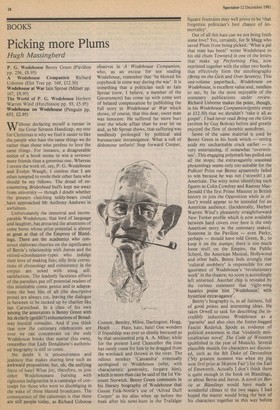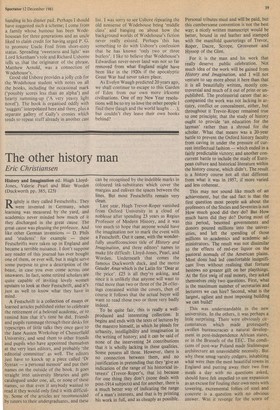Picking more Plums
Hugh Massingberd
P. G. 'Wodehouse Benny Green (Pavilion pp. 256, £8.95) A Wodehouse Companion Richard Usborne (Elm Tree pp. 169, £12.50) Wodehouse at War lain Sproat (Milner pp. 167, £8.95) The World of P. G. Wodehouse Herbert Warren Wind (Hutchinson pp. 93, £5.95) Wodehouse on Wodehouse (Penguin pp. 655, £2.95)
without declaring myself a runner in the Great Sermon Handicap, my text for Christmas is why we find it easier to like the people who hate the same things we do rather than those who profess to love the same things. For instance, a disagreeable notice of a book seems to win a reviewer more friends than a generous one. Whereas I revere the work of, say, P. G. Wodehouse and Evelyn Waugh, I confess that I am often tempted to revile their other fans who should be my fellows. The dread of encountering Brideshead buffs kept me away from university — though I doubt whether the poseurs clutching teddy-bears could have approached Mr Anthony Andrews in awfulness.
Unfortunately the immortal and incomparable Wodehouse, that lord of language and laughter, has attracted the attentions of some bores whose prize potential is almost as great at that of the Empress of Blandings. There are the academics who construct elaborate theories on the significance of Bertie's relationship with Jeeves and the retired-schoolmaster-types who indulge their love of making lists; silly little corrections of chronology and consistency in the corpus are noted with smug selfsatisfaction. The leadenly facetious efforts of the parodists put off potential readers of this inimitable comic genius and in adaptations the best bits of all (the descriptive prose) are always cut, leaving the dialogue in between to be cocked up by charlies like Ian Carmichael. In a class of his own among the annotators is Benny Green with his skolarly (geddit?) exhumations of Broadway musical comedies. And if you think that now the centenary celebrations are over we can concentrate on the only Wodehouse books that matter (his own), remember that Lady Donaldson's authorised biography is still to come.
No doubt it is possessiveness and jealousy that makes sharing love such an awkward proposition; but, oh, the unifying force of hate! What joy, therefore, to join other Wodehouseans burning with righteous indignation in a campaign of contempt for those who were so disobliging in the wake of those blasted broadcasts. The consequence of the calumnies is that there are still people today, as Richard Usborne observes in A Wodehouse Companion, who, as an excuse for not reading Wodehouse, remember that 'he blotted his copybook in some way during the war'. It is something that a politician such as Lain Sproat (now, I believe, a member of the Government) has come up with some sort of belated compensation by publishing the full story in Wodehouse at War which shows, of course, that this dear, sweet man was innocent. He suffered far more hurt over the whole affair than he ever let on and, as Mr Sproat shows, that suffering was needlessly prolonged by political and bureaucratic intransigence. What a roll of dishonour unfurls! Step forward Cooper, Connor, Bentley, Milne, Darlington, Hogg, Heath ... . Hate, hate, hate! One wonders if friendship was ever so slimily betrayed as by that sentimental prig A. A. Milne; while for the present Lord Chancellor the time has surely come for him to be dragged from the woolsack and thrown in the river. The odious monkey 'Cassandra' eventually apologised to Wodehouse (who, with characteristic generosity, forgave him), which is more than can be said of the 1st Viscount Norwich. Benny Green comments in his literary biography of Wodehouse that Gussie Fink-Nottle's use of 'Alfred Duff Cooper' as his alias when up before the beak after his newt-hunt in the Trafalgar Square fountains may well prove to be 'that forgotten politician's best chance of immortality'.
Out of all this hate can we not bring forth some love? Yes, certainly, for St Mugg who saved Plum from being picked. 'What a pal that man has been!' wrote Wodehouse to his old chum Townend in one of the letters that • make up Performing Flea, now reprinted together with the other two books that effectively form the autobiography (Bring on the Girls and Over Seventy). This one-volume paperback, Wodehouse on Wodehouse, is excellent value and, needless to say, by far the most enjoyable of the centenary publications under review. Richard Usborne makes the point, though, in his Wodehouse Companion (pretty steep at £12.50) that we shouldn't `take it all as gospel'. I had never read Bring on the Girls (written by Guy Bolton) before and greatly enjoyed the flow of showbiz anecdotes.
Some of the same material is used by Benny Green in his book which — setting aside my uncharitable crack earlier — is very entertaining, if somewhat 'overwritten'. This engaging polymath has pulled out all the stops; the extravagantly seasoned phraseology seems only too suitable for the Pulitzer Prize our Benny apparently failed to win because he was not ('strewth! ) an American. The witty notes identifying such figures as Cohn Cowdrey and Ramsay MacDonald ('the first Prime Minister in British history to join the Opposition while in office') would appear to be intended for an American audience. (Incidentally, Herbert Warren Wind's pleasantly straightforward New Yorker profile which is now available between hard covers over here is the only American entry in the centenary stakes). Someone in the Pavilion — even Parky, perhaps — should have told Green, B., to keep it on the stumps; there is too much loose stuff on the Empire, the Public School, the American Musical, Hollywood and other balls. Benny feels strongly that 'cultural snobbery' is responsible for our ignorance of Wodehouse's 'revolutionary work' in the theatre; no score is accordingly left unturned. Another chip is revealed by the curious statement that 'right-wing fanatics praise him [Wodehouse] with hysterical extravagance'.
Benny's biography is, in all fairness, full of good points and interesting ideas. He takes Orwell to task for describing the incredibly industrious Wodehouse as a 'parasite' and also cites the footer-bagged Fascist Roderick Spode as evidence of political awareness in that 'virulently antitotalitarian novel' The Code of Woosters (published in the year of Munich). Several plausible models for characters are discussed, such as the 8th Duke of Devonshire ('IVIy greatest moment was when my pig won first prize at Skipton Fair') for the Earl of Emsworth. Actually I don't think there is quite enough in the book on Blandings, or about Bertie and Jeeves. A novel on Berrie at Blandings would have made a wonderful climax to the two sagas; I had hoped the master would bring the best of his characters together in this way before
handing in his dinner pail. Perhaps I should have suggested such a scheme; I come from a family whose humour has been Wodehousean for three generations and an uncle liked to claim credit for having urged P. G. to promote Uncle Fred from short-story status. Spreading 'sweetness and light' was Lord Ickenham's role and Richard Usborne tells us that the originator of the phrase, Matthew Arnold, was a connection of Wodehouse's.
Good old Usbore provides a jolly crib for the Wodehouse student with notes on all the books, including the occasional mark ('possibly scores less than an alpha') and hearty summing-up CA very yeasty light novel'). The book is organised oddly with 'nuggets' interpolated here and there, plus a separate gallery of Gally's cronies which tends to repeat stuff already in another cast list. I was sorry to see Usbore repeating the old nonsense of Wodehouse being 'middle class' and banging on about how the background worlds of Wodehouse's fiction never really existed. Perhaps this has something to do with Usbore's confession that he has known 'only two or three butlers'. I like to believe that Wodehouse's Edwardian never-never land was not so far removed from what England might have been like in the 1920s if the apocalyptic Great War had never taken place.
As Evelyn Waugh predicted 20 years ago, we shall continue to escape to this Garden of Eden from our own more irksome civilisations. One of my New Year resolutions will be to try to love the other people I find there (laugh and the world laughs ...); but couldn't they leave their own books behind?







































 Previous page
Previous page